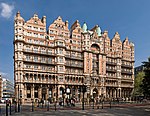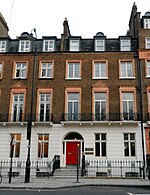Russell Square

Russell Square is a large garden square in Bloomsbury, in the London Borough of Camden, built predominantly by the firm of James Burton. It is near the University of London's main buildings and the British Museum. Almost exactly square, to the north is Woburn Place and to the south-east is Southampton Row. Russell Square tube station sits to the north-east.It is named after the surname of the Earls and Dukes of Bedford; the freehold remains with the latter's conservation trusts who have agreed public access and management by Camden Council. The gardens are in the mainstream, initial category (of Grade II listing) on the Register of Historic Parks and Gardens.In 2005, two terrorist bombings occurred nearby; one on a tube train between Kings Cross St Pancras and Russell Square, the other on a bus (Route 30, on diversion) outside the HQ of the British Medical Association on Tavistock Square. In condolence and commemoration the public and public institutions laid flowers at both squares; Tavistock Square has a later monument. In 2016 the Russell Square stabbing took place.
Excerpt from the Wikipedia article Russell Square (License: CC BY-SA 3.0, Authors, Images).Russell Square
Fountain Plaza, London Bloomsbury (London Borough of Camden)
Geographical coordinates (GPS) Address Nearby Places Show on map
Geographical coordinates (GPS)
| Latitude | Longitude |
|---|---|
| N 51.521666666667 ° | E -0.12611111111111 ° |
Address
Fountain Plaza
Fountain Plaza
London, Bloomsbury (London Borough of Camden)
England, United Kingdom
Open on Google Maps








